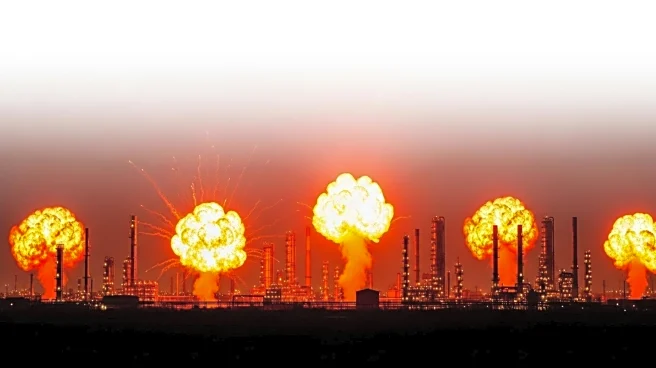What's Happening?
Ukraine has significantly increased its attacks on Russian oil refineries, leading to fuel shortages and price hikes in various regions of Russia. According to BBC Verify and BBC Russian, drone strikes on refineries have surged since August, with 21 out of 38 major refineries targeted since January. These attacks have resulted in long queues at petrol stations and some garages suspending operations due to financial losses. Ukrainian President Volodymyr Zelensky has emphasized that damaging Russia's oil industry is crucial for forcing Russia to negotiate. The strikes have targeted refineries essential for civilian supplies and those near the border supplying troops. Notable attacks include the Gazprom Neftekhim Salavat refinery in Bashkortostan and the Ryazan plant near Moscow.
Why It's Important?
The escalation in attacks on Russian oil refineries by Ukraine is a strategic move to weaken Russia's economic and military capabilities. By targeting critical infrastructure, Ukraine aims to disrupt Russia's fuel supply, which is vital for both civilian and military operations. This tactic could pressure Russia into negotiations, as President Zelensky suggests. The fuel shortages and price increases could lead to public dissatisfaction within Russia, potentially influencing political dynamics. Additionally, the strikes highlight Ukraine's ability to conduct operations deep within Russian territory, showcasing its military capabilities and intelligence operations.
What's Next?
The ongoing attacks on Russian oil refineries are likely to continue as part of Ukraine's strategy to weaken Russia's war efforts. The situation may prompt Russia to enhance its defensive measures around critical infrastructure. Internationally, these developments could influence diplomatic efforts, with countries potentially reassessing their positions and support for Ukraine. The economic impact on Russia might lead to further internal challenges, potentially affecting its political stability. Monitoring the situation closely will be crucial for stakeholders involved in the conflict.
Beyond the Headlines
The attacks on Russian oil refineries by Ukraine could have long-term implications for global energy markets. Disruptions in Russian oil production might affect international oil prices, influencing economic conditions worldwide. Additionally, the focus on energy infrastructure highlights the evolving nature of modern warfare, where economic targets are increasingly prioritized. This shift could lead to changes in military strategies and defense policies globally, as nations adapt to new threats.









